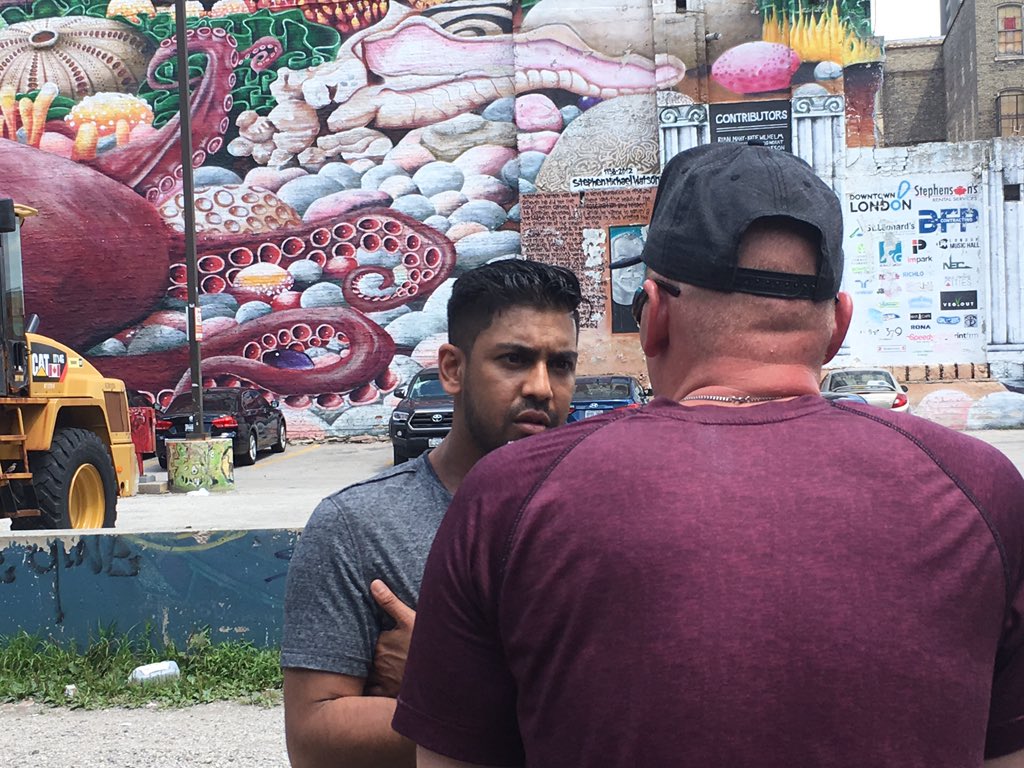Premier Doug Ford says he’s talking to experts about supervised consumption sites. This is what people who use drugs in London have to say about the city’s temporary overdose prevention site (TOPS), and similar sites across Ontario that the province has put on hold.

“They should definitely stay open,” said Jay. The 37-year-old man frequents London’s TOPS at 186 King St., and spoke with Global News on the condition he’d be identified only by his first name.
“If you don’t want drug users in your backyard, then everybody should be voting to keep this open. Because we’re not in your backyard. We’re in this safe spot.”
PART TWO: Health officials push for safe injection site in Peterborough to tackle opioid crisis
Jay’s struggle with addiction began when he was diagnosed with cancer, and was prescribed hydromorphone for his pain. After surgery and a two-and-a-half month hospital stay, Jay had beaten the cancer.
But when his doctor abruptly stopped signing his prescription, Jay’s addiction took a turn for the worse.
Had the doctor told him recreational drug use would risk their relationship or his pain medication, Jay said he wouldn’t have done cocaine. But the doctor handed him a final prescription, and told him not to come back.
For Jay, the overdose prevention site isn’t just a place where he can use, away from the judgmental glares he receives in public.
“There are people that care,” he explained.
“Say you want to go to treatment. There are people there who can help you and direct you in the right path to do that. And if you’re not at these places, you’re not going to have that option.”
Sonja Burke is the director of Counterpoint Harm Reduction Services at Regional HIV/AIDS Connection (RHAC) in London, the facility in which London’s overdose prevention site is embedded.
“The opposite of addiction is connection,” Burke said.
“When people are completely isolated and they’re not able to connect with services, then the idea of addressing the addiction is not even possible for them.”
When people first access the site, Burke said many of them don’t know their self-value and don’t feel any reason to stop.
“This place gives people the opportunity to just connect, to be treated with dignity and respect, and to have the opportunity to have health care services in a way that actually provides them enough safety and say, … ‘I’m actually worth something.'”
As of mid-August, the overdose prevention site in London said it had referred nearly 10 per cent of clients to rehab. It also reported more than 7,000 visits by 2,000 unique individuals. In recent weeks, there’s been a dramatic increase in the number of overdoses that have been reversed. In the month of August, there were 23 overdoses, compared to just eight overdoses between its opening in mid-February and Aug. 1.
Chris Warrington, who also frequents the TOPS, has been using drugs for five years and has been injecting for two years. Ford’s consultation process is set to end Sept. 30th, the same day TOPS provincial funding runs out, and Warrington is frustrated Ford might decide to close the facility.
“They’re just assuming things. They’re not looking for any kind of information. … It’s stupid. They should actually take a little time to look into what they’re talking about,” he said.
The premier has also put sites in St. Catharines, Peterborough, and Toronto on hold.
“It has nothing to do with them continuing to use drugs,” Warrington went on.
“It just gives them a safe site to use, and clean supplies, and support. If you don’t have it, you’re just going to have a lot more junkies around.”
In April, Global News Radio 980 CFPL explored opioid-use in London in the three-part radio series “Death Dealing.” Josh Van Biesbrouck, a 37-year-old London man, was in the throes of addiction with he first shared his story for Part One.
Now in recovery, Van Biesbrouck believes Ford’s approach towards supervised consumption is “uneducated.” He wants the provincial government to know that supervised consumption saves lives.
“Without these places, people are going to die. They’re going to die from infections, and they’re going to die from overdoses,” he said.





-ONLINE_848x480_1313697859919.jpg?w=1040&quality=70&strip=all)





Comments